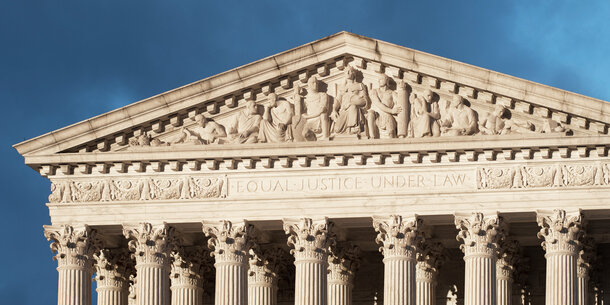While the Supreme Court’s recent blockbuster decisions have captured the public’s attention, we should not lose sight of last week’s 6–3 decision in Snyder v. United States, which dramatically narrows federal safeguards against state public corruption. Snyder risks being lumped in with the other recent decisions limiting the reach of federal anticorruption laws, but it is actually a significant escalation of those rulings — one that could not have come at a worse time.
James Snyder was the mayor of Portage, Indiana. He accepted more than $13,000 in kickbacks from a local truck dealership as a reward for steering the dealership more than $1 million in city contracts. He was prosecuted for violating a federal law that bars state and local government officials from “corruptly” accepting “anything of value of any person, intending to be influenced or rewarded” for an official act. This provision has long been understood to criminalize both the knowing acceptance of bribes (payments in exchange for a future decision) as well as “gratuities” (payments to reward past actions).
The majority opinion, authored by Justice Brett Kavanaugh and joined by the other conservative members of the Court, throws this long-standing interpretation out the window. The Court reversed Snyder’s conviction, holding that the law applies only to bribes, not gratuities. The justification for reaching this result is a somewhat tortured analysis of both the law’s wording and the fact that it is structured differently than another statute that prohibits bribes and gratuities for federal officials. The majority also justifies its narrow reading of the law by invoking “federalism” concerns (because the statute targets state-level misconduct) and runs through a parade of horribles that supposedly could follow from an overbroad interpretation, such as local trash collectors being convicted for accepting gift cards from city residents.
In a forceful dissent joined by her fellow liberal justices, Justice Ketanji Brown Jackson takes the majority to task for its “absurd and atextual reading” of the law. As the dissent points out, “Everyone knows what a reward is,” and even Snyder’s own lawyers conceded that the term could encompass the gratuities he received. That is almost certainly what Congress intended. The statute only targets state and local entities that receive federal funds, so there is a clear federal interest. And there is no evidence that it has been used to prosecute public employees for accepting small tokens of appreciation like gift cards, as the law only prohibits gratuities accepted “corruptly,” which clearly precludes prosecuting people for accepting modest customary gifts.
In short, the justices in the majority, who are all part of a conservative legal movement that extols textualism and originalism — faithfulness to the plain meaning of constitutional and statutory texts at the time they were enacted — ignored these values entirely to eviscerate a key anticorruption safeguard.
Snyder is likely to be viewed as the latest in a series of cases in which the Court has curtailed the so-called criminalization of politics. These other cases have generally involved aggressive federal prosecutions of tawdry behavior, such as former Virginia governor Bob McDonnell using his office to market a company’s dietary supplements in exchange for hundreds of thousands of dollars in cash, vacations, and shopping sprees from the company’s founder. The Court has overruled many of these convictions 9–0, with liberal-leaning justices sharing their conservative colleagues’ due process concern that, however distasteful their conduct, the perpetrators in these cases could not reasonably have known their behavior would land them in federal prison because it did not clearly fall within the plain scope of the laws at issue.
These decisions arguably give short shrift to the damage caused by some of the defendants’ conduct. In another case, the “Bridgegate” prosecution of New Jersey state officials who partially shut down the George Washington Bridge as retribution for a New Jersey mayor’s refusal to endorse the reelection of Gov. Chris Christie, the defendants’ actions inconvenienced thousands of motorists and may have endangered lives by slowing down emergency responders.
Nevertheless, the Court’s unanimity in Bridgegate and other cases underscores that criminal anticorruption laws are a heavy hammer whose application needs to be grounded in more than mere moral disapproval of a defendant’s behavior.
Snyder is different in this regard. Snyder’s conduct was a textbook example of kickbacks that no reasonable person would assume were legal. Although the Court’s decision still leaves room for states to punish such misconduct, the majority’s determination to hollow out long-standing safeguards against corruption does not inspire confidence as to how other laws will be interpreted in future cases.
As Jackson’s dissent says: “Greed makes government — at every level — less responsive, less efficient, and less trustworthy from the perspective of the communities they serve.” At a time when confidence in American public institutions, including the Court, is at record lows, Snyder should have been an easy case for the justices. The fact that it was not is another example of how removed from ordinary Americans the Court has become.




